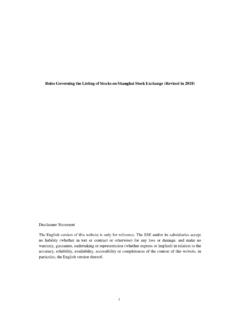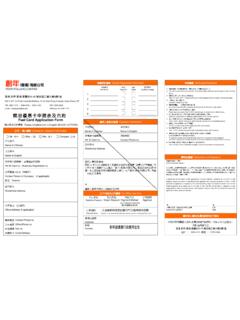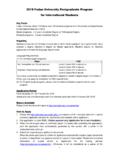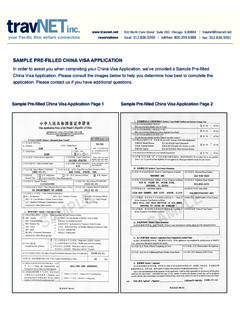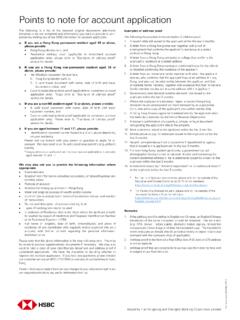Transcription of TRADING RULES OF SHANGHAI STOCK EXCHANGE
1 TRADING RULES OF SHANGHAI STOCK EXCHANGE . Circular on the Promulgation of the TRADING RULES of SHANGHAI STOCK EXCHANGE The TRADING RULES of SHANGHAI STOCK EXCHANGE have been approved by China Securities Regulatory Commission and are hereby promulgated for implementation as of July 1, 2006. The relevant detailed RULES will be promulgated separately. SHANGHAI STOCK EXCHANGE May 15, 2006. 1. Contents Chapter I General Provisions ..3. Chapter II TRADING Section 1 Marketplace ..3. Section 2 TRADING Participants and TRADING Section 3 TRADING Section 4 TRADING Chapter III Securities Section 1 General Section 2 Designated Section 3 Client Section 4 Order Section 5 Section 6 Execution ..10. Section 7 Block Section 8 Bond Repo Chapter IV Other TRADING -related Section 1 Opening Price and Closing Section 2 Listing, Delisting, Trade Suspension and Resumption ..14.
2 Section 3 Ex-right and Chapter V TRADING Information ..16. Section 1 General Section 2 Real-time Section 3 Securities Indices ..17. Section 4 Public Information on Securities TRADING ..17. Chapter VI Supervision of TRADING Chapter VII Handling of Extraordinary Circumstances During Chapter VIII TRADING Disputes ..21. Chapter IX TRADING Fees ..21. Chapter X Disciplinary Sanctions ..21. Chapter XI Supplementary Provisions ..22. 2. Chapter I General Provisions The TRADING RULES have been formulated in accordance with the Securities Law of the People's Republic of China and other laws, administrative regulations, RULES of State departments and the Constitution of SHANGHAI STOCK EXCHANGE in order to regulate securities TRADING activities, safeguard the order in the securities market and protect the legitimate rights and interests of investors. The TRADING RULES are applicable to the TRADING of securities and derivatives (hereinafter collectively referred to as securities) listed on SHANGHAI STOCK EXCHANGE (hereinafter referred to as the EXCHANGE ).
3 Any matter not specified in the TRADING RULES shall be governed by other applicable RULES of the EXCHANGE . The principle of openness, fairness and justice shall be followed in the TRADING of securities. TRADING of securities shall comply with laws, administrative regulations, RULES of State departments and the relevant RULES of the EXCHANGE and shall be based on the principle of free will, compensation, honesty and good faith. Securities shall be traded on a dematerialized and centralized basis or by such other means as China Securities Regulatory Commission (hereinafter referred to as the CSRC) may approve. Chapter II TRADING Market Section 1 Marketplace The EXCHANGE provides the marketplace and facilities for securities TRADING . The marketplace and facilities comprise the EXCHANGE TRADING system, TRADING floor, Participant Business Unit, order routing system and relevant communication systems.
4 The EXCHANGE has a TRADING floor. The EXCHANGE members (hereinafter referred to as members) shall input orders through their traders dispatched to the TRADING floor. Unless specially permitted by the EXCHANGE , only the following persons are admitted to the TRADING floor: (1) registered traders; and (2) in-floor supervisors. Section 2 TRADING Participants and TRADING Rights In order to trade securities on the EXCHANGE , members and the institutions 3. approved by the EXCHANGE shall apply to the EXCHANGE for relevant seats and the right to trade so as to become the EXCHANGE TRADING participants. TRADING participants shall conduct securities TRADING through the Participant Business Unit for which they have applied to the EXCHANGE . Participant Business Unit refers to a basic unit that allows a TRADING participant to trade securities on the EXCHANGE , to own and exercise relevant TRADING rights and to be subject to the administration of the EXCHANGE in respect of relevant TRADING business.
5 Detailed RULES on the administration of Participant Business Unit and relevant TRADING rights will be formulated by the EXCHANGE separately and shall come into effect upon the approval of the CSRC. Section 3 TRADING Instruments The following securities can be listed and traded on the EXCHANGE : (1) stocks ;. (2) mutual funds;. (3) bonds;. (4) bond repos;. (5) warrants; and (6) other instruments as approved by the CSRC. Section 4 TRADING Hours The EXCHANGE is open for TRADING from Monday to Friday. The market is closed on public holidays and other days as announced by the EXCHANGE . In case of auction TRADING , the opening call auction runs from 9:15 to 9:25 on each TRADING day, while the continuous auction runs from 9:30 to11:30 and from 13:00. to 15:00, except for the securities whose TRADING is suspended and resumed during TRADING hours. With the approval of the CSRC, the EXCHANGE may adjust TRADING hours in line with the market development.
6 In case of temporary market closure for certain reasons, TRADING hours will not be extended. 4. Chapter III Securities TRADING Section 1 General RULES Upon the acceptance of an investor's instruction, a member shall place an order with the EXCHANGE as instructed and assume corresponding TRADING and settlement obligations. After the member executes the order instructed by the investor, the investor shall deliver the relevant securities or pay corresponding cash to the member while the member shall hand over the proceeds from its sale of the securities or deliver the purchased securities to the investor. Members shall send buy or sell orders to the EXCHANGE TRADING system through their Participant Business Units and relevant order routing system and effect trades according to the TRADING RULES . TRADING results and other records are sent to members by the EXCHANGE .
7 Members shall keep under safe custody the records of their clients' instructions and their order routing activities according to relevant regulations. Securities purchased by investors shall not be resold before settlement, except for turn-around trades. A turn-around trade of securities refers to a complete or partial resale, after confirmation of execution but before settlement, of any securities purchased by investors. Turn-around trades of bonds and warrants are effected on the day of TRADING , whereas turn-around trades of B-shares are effected from the next TRADING day. The EXCHANGE may adopt the market maker system in line with market conditions. The specific RULES thereon will be formulated by the EXCHANGE separately and will come into effect upon the approval of the CSRC. Section 2 Designated TRADING The EXCHANGE implements a designated TRADING system for all the securities traded on the EXCHANGE market, except B shares traded by overseas investors.
8 Under the designated TRADING system, an investor who trades securities on the EXCHANGE must designate one member in advance as its agent and participate in TRADING through the designated member. 5. An investor shall enter into an agreement with a member for designated TRADING and specify therein the rights, obligations and responsibilities of both parties. Once such agreement is signed, the member shall input the instruction of designated TRADING into the EXCHANGE TRADING system based on the application of the investor. The EXCHANGE accepts designated TRADING instructions during TRADING hours. Such instructions become valid immediately after being accepted by the EXCHANGE TRADING system. An investor who intends to change its designated member shall file a cancellation application with the designated member, who shall input the instruction of cancellation into the EXCHANGE TRADING system accordingly.
9 The designated member may not restrict, obstruct or delay the cancellation of designated TRADING by investors who meet the conditions for the cancellation. Once the designated TRADING is cancelled, another member may be designated for re-application for designated TRADING . Other matters in respect of designated TRADING shall be governed by the relevant regulations of the EXCHANGE . Section 3 Client Instruction In order to trade securities, investors shall open securities accounts and cash accounts and sign broker-client agreements with a member. Upon effect of the agreement, the investors will become the brokerage clients (hereinafter referred to as client) of the member. Investors shall open securities accounts according to the relevant regulations of the registration and clearing institution designated by the EXCHANGE . Clients may instruct a member in writing or by self-service means such as telephone, self-service terminal or Internet to buy or sell securities on their behalf.
10 Clients shall follow the relevant operational procedures when placing an order through telephone, self-service terminal or Internet. Clients who intend to participate in securities TRADING by self-service means shall sign a self-service TRADING agreement with a member. Unless otherwise specified by the EXCHANGE , an order placed by a client shall include the following: (1) client's securities account number;. (2) code of a particular security;. (3) buy or sell;. 6. (4) instructed quantity;. (5) instructed price; and (6) other information as required by the EXCHANGE and the member. Clients may place a limit order or market order through members for securities TRADING . A limit order is an instruction given by a client to a member to buy a particular security at a specified price or lower, or to sell at a specified price or higher. A market order is an instruction given by a client to a member to buy or sell a particular security at the current best market price.
